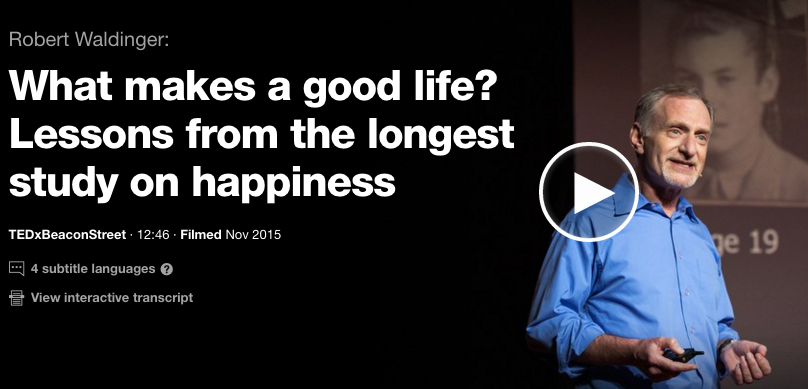By estherlangerhorst
Harvard neuroscientist: Meditation not only reduces stress, here’s how it changes your brain
Sara Lazar, a neuroscientist at Massachusetts General Hospital and Harvard Medical School, was one of the first scientists to take the anecdotal claims about the benefits of meditation and mindfulness and test them in brain scans. What she found surprised her — that meditating can literally change your brain. She explains:
Q: Why did you start looking at meditation and mindfulness and the brain?
Lazar: A friend and I were training for the Boston marathon. I had some running injuries, so I saw a physical therapist who told me to stop running and just stretch. So I started practicing yoga as a form of physical therapy. I started realizing that it was very powerful, that it had some real benefits, so I just got interested in how it worked.
The yoga teacher made all sorts of claims, that yoga would increase your compassion and open your heart. And I’d think, ‘Yeah, yeah, yeah, I’m here to stretch.’ But I started noticing that I was calmer. I was better able to handle more difficult situations. I was more compassionate and open hearted, and able to see things from others’ points of view.
I thought, maybe it was just the placebo response. But then I did a literature search of the science, and saw evidence that meditation had been associated with decreased stress, decreased depression, anxiety, pain and insomnia, and an increased quality of life.
At that point, I was doing my PhD in molecular biology. So I just switched and started doing this research as a post-doc.
Q: How did you do the research?
Lazar: The first study looked at long term meditators vs a control group. We found long-term meditators have an increased amount of gray matter in the insula and sensory regions, the auditory and sensory cortex. Which makes sense. When you’re mindful, you’re paying attention to your breathing, to sounds, to the present moment experience, and shutting cognition down. It stands to reason your senses would be enhanced.
We also found they had more gray matter in the frontal cortex, which is associated with working memory and executive decision making.
[Related: You’re missing out on your experiences: A meditation expert explains how to live in the moment]
It’s well-documented that our cortex shrinks as we get older – it’s harder to figure things out and remember things. But in this one region of the prefrontal cortex, 50-year-old meditators had the same amount of gray matter as 25-year-olds.
So the first question was, well, maybe the people with more gray matter in the study had more gray matter before they started meditating. So we did asecond study.
We took people who’d never meditated before, and put one group through an eight-week mindfulness- based stress reduction program.
https://www.washingtonpost.com/news/inspired-life/wp/2015/05/26/harvard-neuroscientist-meditation-not-only-reduces-stress-it-literally-changes-your-brain/
Q: What did you find?
Lazar: We found differences in brain volume after eight weeks in five different regions in the brains of the two groups. In the group that learned meditation, we found thickening in four regions:
1. The primary difference, we found in the posterior cingulate, which is involved in mind wandering, and self relevance.
2. The left hippocampus, which assists in learning, cognition, memory and emotional regulation.
3. The temporo parietal junction, or TPJ, which is associated with perspective taking, empathy and compassion.
4. An area of the brain stem called the Pons, where a lot of regulatory neurotransmitters are produced.
The amygdala, the fight or flight part of the brain which is important for anxiety, fear and stress in general. That area got smaller in the group that went through the mindfulness-based stress reduction program.
The change in the amygdala was also correlated to a reduction in stress levels.
[Related: Science shows that stress has an upside. Here’s how to make it work for you]
Q: So how long does someone have to meditate before they begin to see changes in their brain?
Lazar: Our data shows changes in the brain after just eight weeks.
In a mindfulness-based stress reduction program, our subjects took a weekly class. They were given a recording and told to practice 40 minutes a day at home. And that’s it.
Q: So, 40 minutes a day?
Lazar: Well, it was highly variable in the study. Some people practiced 40 minutes pretty much every day. Some people practiced less. Some only a couple times a week.
In my study, the average was 27 minutes a day. Or about a half hour a day.
There isn’t good data yet about how much someone needs to practice in order to benefit.
Meditation teachers will tell you, though there’s absolutely no scientific basis to this, but anecdotal comments from students suggest that 10 minutes a day could have some subjective benefit. We need to test it out.
We’re just starting a study that will hopefully allow us to assess what the functional significance of these changes are. Studies by other scientists have shown that meditation can help enhance attention and emotion regulation skills. But most were not neuroimaging studies. So now we’re hoping to bring that behavioral and neuroimaging science together.
Q: Given what we know from the science, what would you encourage readers to do?
Lazar: Mindfulness is just like exercise. It’s a form of mental exercise, really. And just as exercise increases health, helps us handle stress better and promotes longevity, meditation purports to confer some of those same benefits.
But, just like exercise, it can’t cure everything. So the idea is, it’s useful as an adjunct therapy. It’s not a standalone. It’s been tried with many, many other disorders, and the results vary tremendously – it impacts some symptoms, but not all. The results are sometimes modest. And it doesn’t work for everybody.
It’s still early days for trying to figure out what it can or can’t do.
Q: So, knowing the limitations, what would you suggest?
Lazar: It does seem to be beneficial for most people. The most important thing, if you’re going to try it, is to find a good teacher. Because it’s simple, but it’s also complex. You have to understand what’s going on in your mind. A good teacher is priceless
Q: Do you meditate? And do you have a teacher?
Lazar: Yes and yes.
Q: What difference has it made in your life?
Lazar: I’ve been doing this for 20 years now, so it’s had a very profound influence on my life. It’s very grounding. It’s reduced stress. It helps me think more clearly. It’s great for interpersonal interactions. I have more empathy and compassion for people.
Q: What’s your own practice?
Lazar: Highly variable. Some days 40 minutes. Some days five minutes. Some days, not at all. It’s a lot like exercise. Exercising three times a week is great. But if all you can do is just a little bit every day, that’s a good thing, too. I’m sure if I practiced more, I’d benefit more. I have no idea if I’m getting brain changes or not. It’s just that this is what works for me right now.






